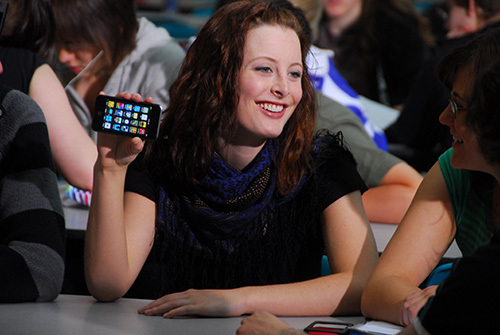
Αξιότιμο Jeff Johnson, Υπουργός Παιδείας για την Αλμπέρτα, talked to me last November about his experience as co-chair of the province’s pioneering “Έμπνευση Εκπαίδευση” πρωτοβουλία. The question posed by his steering committee to all Albertans was: What kinds of skills and attributes should an educated Albertan graduating in 2030 have? The response, which became the inspiration for education reform in Alberta, was that students needed to be three things: engaged thinkers, ethical citizens, and they needed to have an entrepreneurial spirit. What role has technology played in helping educators achieve these goals? I decided it was time to invite Jeff back to Η Σφαιρική Αναζήτηση για Εκπαίδευση series to give us an update.
Prior to his position as Minister of Education for Alberta, Honourable Jeff Johnson was Minister of Infrastructure, Minister responsible for the Oil Sands Secretariat, and Parliamentary Assistant to the Treasury Board. Jeff also has experience working in the financial markets as a futures trading floor pit boss and in building a series of successful small businesses.
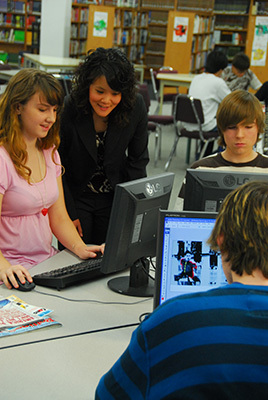
How has technology impacted the Alberta education system? Τι εκπαιδευτικοί θεωρούν τα πλεονεκτήματα και τα μειονεκτήματα από την άποψη της μάθησης?
Advances in technology have had a big impact on the world and, σαν άποτέλεσμα, a big impact on our education system as well. Kids today grow up in a world where they have information at their fingertips and education has had to adjust to meet the needs of those students. This is both a challenge and an opportunity for Alberta’s educators.
When we talked with Albertans during the Έμπνευση Εκπαίδευση dialogue, one of the main topics of discussion was technology. Albertans told us that we needed to shift from using technology to support teaching to using technology to support the creation and the sharing of knowledge. A part of that is the development of competencies. We are currently shifting Alberta’s curriculum towards competency-based learning. That means that instead of memorizing facts, kids today are learning skills. Για παράδειγμα, they are learning how to use knowledge to tell fact from fiction online. This is crucial in an age of Wikipedia – kids need to know how to tell if information is credible, a skill that will be important for their entire lives.
The impact of technology on teaching has also been significant. Οι εκπαιδευτικοί χρησιμοποιούν σήμερα έξυπνες πίνακες, έτσι ώστε τα παιδιά μπορούν να αλληλεπιδράσουν με τα μαθήματά τους. Χρησιμοποιούν ψηφιακές φωτογραφικές μηχανές και φορητούς υπολογιστές, έτσι ώστε τα παιδιά μπορούν να τραβάει βίντεο και να κάνουν παρουσιάσεις. Και η τεχνολογία επιτρέπει στους καθηγητές στα μαθήματα παραγγελία σε ένα περιβάλλον χωρίς αποκλεισμούς – providing visual cues for someone with a hearing impairment, για παράδειγμα, ή προσαρμογή μαθήματα για τα παιδιά με αυτισμό.
Πώς είναι ο ρόλος του δασκάλου αλλάζει στην ψηφιακή εποχή?
Η πρόσβαση στην τεχνολογία και τις πληροφορίες που έχει αναγκάσει τους δασκάλους να σκεφτούν διαφορετικά για τον τρόπο που πρόκειται για την εκμάθηση. Οι εκπαιδευτικοί όχι μόνο πρέπει να είναι οι χρήστες της τεχνολογίας και των ψηφιακών πόρων, but they have to be keenly aware that students need to understand that information in a digital age needs to be validated. Teachers need to shift their thinking from a single answer or source of information to accommodating multiple ways of getting to the answer using a variety of sources of information. It permits students to engage in new knowledge creation in ways that have never been possible before. Teachers are now more accessible to parents than they have ever been in the past, which is also a different paradigm for teachers.
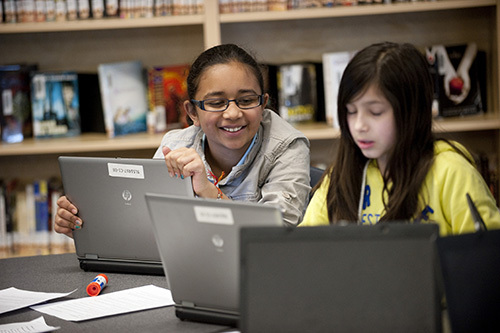
Ολόκληρες πολιτείες στις ΗΠΑ έχουν υιοθετήσει την ψηφιακή σχολικά βιβλία. Πανεπιστημιακές βιβλιοθήκες γίνονται αποθετήρια του ψηφιακού περιεχομένου. Many would say textbooks have already gone digital and indeed the next generation of digital content is not far behind. What digital learning tools have been implemented in Alberta classrooms and what do educators see as the pros and cons of these?
Οι σχολικές αρχές ενδιαφέρονται ολοένα και περισσότερο για την ενσωμάτωση της τεχνολογίας και ψηφιακών πόρων στις τάξεις τους. Through LearnAlberta.ca, Αλμπέρτα Εκπαίδευσης έχει την παροχή ηλεκτρονικής πρόσβασης στο εκπαιδευτικό υλικό από το 2001. Αυτή η ιστοσελίδα είναι οικοδεσπότης σε περίπου 8,500 πόροι. Υλικά περιλαμβάνουν τη διδασκαλία και τη μάθηση των πόρων (μερικά με τη μορφή διαδραστικών εφαρμογές και λογισμικό εμπλοκής) που συσχετίζονται άμεσα με τα προγράμματα σπουδών, καθώς και τα υλικά αναφοράς, and access to online programs of study and assessment materials. LearnAlberta.ca has seen an increase in the use of digital materials for teachers and students following the Alberta programs of study.
Εξάλλου, five Alberta school boards are piloting the development of a Collaborative Online Resource Environment (CORE), accessible at http://www.albertacore.ca, to collaboratively acquire, αναπτύξουν, store, manage, and share digital classroom resources for anytime, οπουδήποτε μάθηση. Μέχρι σήμερα, students and teachers enjoy shared access over a common infrastructure to over 165,000 digital resources. Users can contribute resources they find of value, and can comment on effective ways they have used these in learning environments. The University of Calgary is conducting formal research on this innovative project.
In Alberta, school authorities have maximum flexibility to determine what kinds of resources they will make available to their students, and what policies they will put in place to guide the use of these resources. Teachers determine for themselves what level of technology use is most appropriate to meet the needs of their students. Whatever resources teachers and school authorities select, equity of access and support for inclusive classrooms will continue to be guiding priorities in those decisions.
Tablets have been found to be extremely helpful in supporting students with unique learning needs – examples include:
- Increasing font size for dyslexic students – helps to de-clutter their vision
- English Language Learners – can use the recording features to see and hear themselves speaking which helps with language acquisition
- Sign 4 Me app – helps to facilitate communication between a deaf student and his classmates

How has technology impacted curriculum design in Alberta?
Through Curriculum Redesign, we are looking at various shifts for curriculum and curriculum development. One of these shifts is to move to a more digitally based curriculum (programs of study, assessments, and learning and teaching resources).
Η δύναμη της τεχνολογίας θα πρέπει να αξιοποιηθεί για την υποστήριξη της καινοτομίας και της ανακάλυψης. Οραματιζόμαστε ότι η μετάβαση σε πιο ψηφιακά βασισμένα προγράμματα σπουδών θα επιτρέψει μεγαλύτερη ευελιξία σε τοπικό επίπεδο για την υποστήριξη της μάθησης ανά πάσα στιγμή, τόπος ή ρυθμός, καθώς και την ευκαιρία για συνεχή βελτίωση και ανανέωση προγραμμάτων σπουδών και μαθησιακών πόρων.
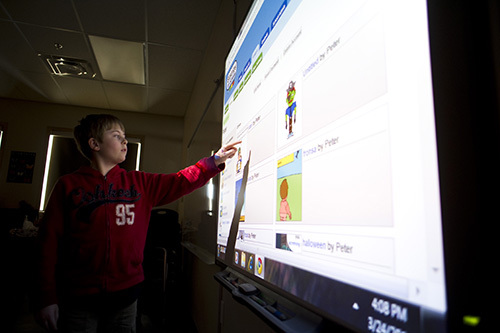
Η τελευταία έρευνα του Pew δείχνει για άλλη μια φορά ότι η χρήση των δισκίων, κινητά τηλέφωνα, internet sources and social media platforms such as Facebook and Twitter continues to infiltrate classrooms in the US rapidly. Are you seeing the same trend in Alberta classrooms? Σε ποιο βαθμό είναι η χρήση αυτών των εργαλείων μέρος του προγράμματος σπουδών σας? Είναι μια ηλικία κάτω από το οποίο πιστεύετε ότι αυτά τα εργαλεία δεν είναι κατάλληλα στις τάξεις εκεί?
Alberta is seeing these same trends. We would say that technology is being used appropriately across all grades because in Alberta we have balanced curriculum that includes a balance of learning activities, with technology and other resources, as well as interaction and daily physical activity.
Alberta Education is currently engaged in a research community of practice that is investigating potential uses of technology, including tablet devices, in Kindergarten to Grade 4 τάξεις. One of the focuses is to explore what applications of technology are most effective and appropriate for various age groups.
There are several school authorities in Alberta that have invested in class or school sets or portable carts of tablet or laptop devices, like Chromebooks, and interest in educational technology continues to increase throughout the education system. Alberta Education is currently working to finalize an updated Learning and Technology Policy Framework to establish a common vision for technology’s role in education, in alignment with Έμπνευση Εκπαίδευση. This vision will help decision makers at all levels take appropriate actions that will complement each other and yield maximum benefit for students.

All photos are courtesy of Ministry of Education Alberta.
Για περισσότερα άρθρα στο Got Tech? σειρά: Η Σφαιρική Αναζήτηση για Εκπαίδευση: Πήρε Tech? – Φινλανδία, Η Σφαιρική Αναζήτηση για Εκπαίδευση: Πήρε Tech? – Αυστραλία, Η Σφαιρική Αναζήτηση για Εκπαίδευση: Πήρε Tech? – Σιγκαπούρη, Η Σφαιρική Αναζήτηση Για την Εκπαίδευση: Πήρε Tech?- Ηνωμένες Πολιτείες, Η Σφαιρική Αναζήτηση Για την Εκπαίδευση: Πήρε Tech? ΙΒ Σχολεία σε έναν εικονικό κόσμο, Η Σφαιρική Αναζήτηση για Εκπαίδευση: Πήρε Tech? – Αργεντινή
Στο παγκόσμιο Αναζήτηση για Εκπαίδευση, μαζί μου και παγκοσμίως γνωστή ηγέτες σκέψης συμπεριλαμβανομένου του Sir Michael Κομμωτήριο (Ηνωμένο Βασίλειο), Ο Δρ. Michael Block (ΗΠΑ), Ο Δρ. Leon Botstein (ΗΠΑ), Καθηγητής Clay Christensen (ΗΠΑ), Ο Δρ. Linda Ντάρλινγκ-Hammond (ΗΠΑ), Ο Δρ. Madhav Chavan (Ινδία), Ο καθηγητής Michael Fullan (Καναδάς), Ο καθηγητής Howard Gardner (ΗΠΑ), Ο καθηγητής Andy Hargreaves (ΗΠΑ), Ο καθηγητής Yvonne Hellman (Η Ολλανδία), Ο καθηγητής Kristin Helstad (Νορβηγία), Jean Hendrickson (ΗΠΑ), Καθηγητής Rose Hipkins (Νέα Ζηλανδία), Καθηγητής Cornelia Hoogland (Καναδάς), Αξιότιμο Jeff Johnson (Καναδάς), Η κ. Chantal Kaufmann (Βέλγιο), Ο Δρ. Eija Kauppinen (Φινλανδία), Υφυπουργός Tapio Kosunen (Φινλανδία), Ο καθηγητής Dominique Λαφοντέν (Βέλγιο), Ο καθηγητής Hugh Lauder (Ηνωμένο Βασίλειο), Καθηγητής Ben Levin (Καναδάς), Lord Ken Macdonald (Ηνωμένο Βασίλειο), Καθηγητής Barry McGaw (Αυστραλία), Shiv Nadar (Ινδία), Καθηγητής R. Natarajan (Ινδία), Ο Δρ. PAK NG (Σιγκαπούρη), Ο Δρ. Denise Πάπα (ΗΠΑ), Sridhar Rajagopalan (Ινδία), Ο Δρ. Diane Ravitch (ΗΠΑ), Richard Wilson Riley (ΗΠΑ), Sir Ken Robinson (Ηνωμένο Βασίλειο), Καθηγητής Pasi Sahlberg (Φινλανδία), Καθηγητής Manabu Sato (Ιαπωνία), Andreas Schleicher (PISA, ΟΟΣΑ), Ο Δρ. Anthony Seldon (Ηνωμένο Βασίλειο), Ο Δρ. David Shaffer (ΗΠΑ), Ο Δρ. Kirsten Μοναδική Are (Νορβηγία), Στήβεν Spahn (ΗΠΑ), Yves Theze (Lycee Francais Η.Π.Α.), Ο καθηγητής Charles Ungerleider (Καναδάς), Ο καθηγητής Tony Wagner (ΗΠΑ), Sir David Watson (Ηνωμένο Βασίλειο), Καθηγητής Dylan Γουίλιαμ (Ηνωμένο Βασίλειο), Ο Δρ. Mark Wormald (Ηνωμένο Βασίλειο), Ο καθηγητής Theo Wubbels (Η Ολλανδία), Ο καθηγητής Michael Young (Ηνωμένο Βασίλειο), και ο καθηγητής Minxuan Zhang (Κίνα) καθώς εξερευνούν τα μεγάλα ζητήματα της εκπαίδευσης εικόνα που όλα τα έθνη αντιμετωπίζουν σήμερα. Η Παγκόσμια αναζήτηση για την Εκπαίδευση της Κοινότητας Σελίδα
C. M. Rubin είναι ο συγγραφέας των δύο πολυδιαβασμένα online σειρά για την οποία έλαβε ένα 2011 Βραβείο Upton Sinclair, “Η Σφαιρική Αναζήτηση για Εκπαίδευση” και “Πώς θα μας Διαβάστε?” Είναι επίσης ο συγγραφέας του μπεστ σέλερ τρία βιβλία, Συμπεριλαμβανομένων Η Ρεάλ Αλίκη στη Χώρα των Θαυμάτων.


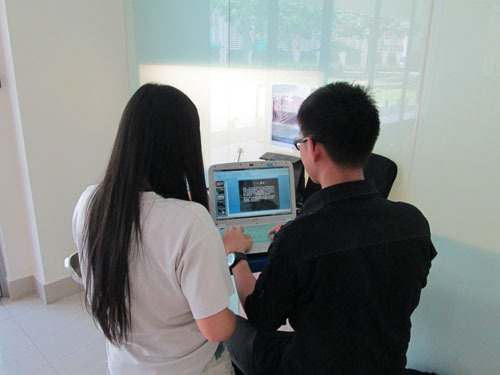
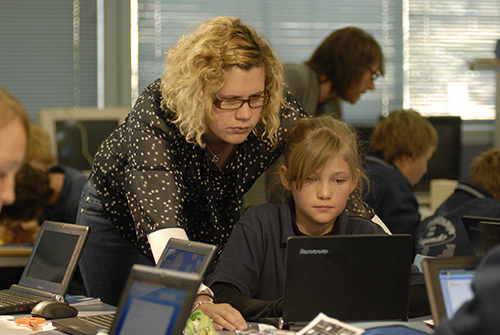
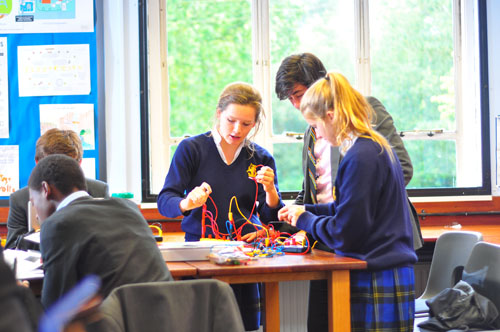
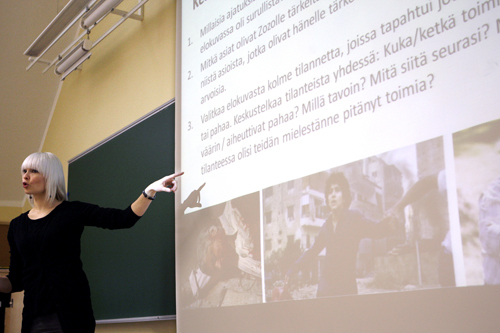
Πρόσφατα σχόλια